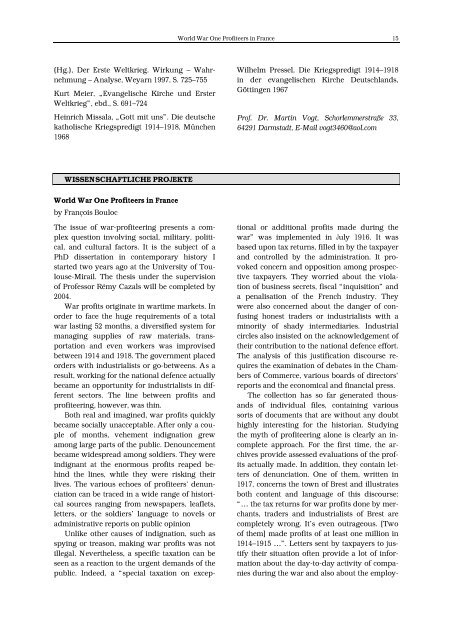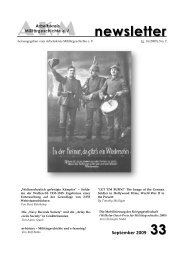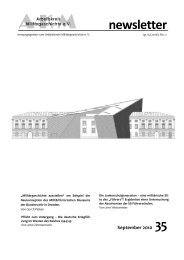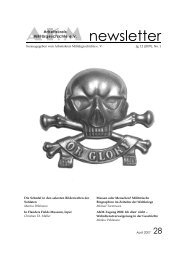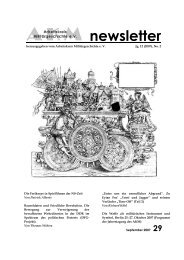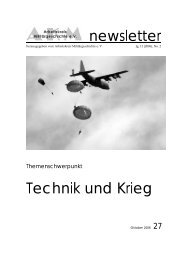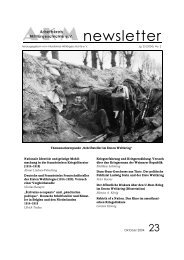Geschichte Erster Weltkrieg - Portal Militärgeschichte - Arbeitskreis ...
Geschichte Erster Weltkrieg - Portal Militärgeschichte - Arbeitskreis ...
Geschichte Erster Weltkrieg - Portal Militärgeschichte - Arbeitskreis ...
Sie wollen auch ein ePaper? Erhöhen Sie die Reichweite Ihrer Titel.
YUMPU macht aus Druck-PDFs automatisch weboptimierte ePaper, die Google liebt.
(Hg.), Der Erste <strong>Weltkrieg</strong>. Wirkung – Wahrnehmung<br />
– Analyse, Weyarn 1997, S. 725–755<br />
Kurt Meier, „Evangelische Kirche und <strong>Erster</strong><br />
<strong>Weltkrieg</strong>”, ebd., S. 691–724<br />
Heinrich Missala, „Gott mit uns”. Die deutsche<br />
katholische Kriegspredigt 1914–1918, München<br />
1968<br />
WISSENSCHAFTLICHE PROJEKTE<br />
World War One Profiteers in France<br />
by François Bouloc<br />
The issue of war-profiteering presents a complex<br />
question involving social, military, political,<br />
and cultural factors. It is the subject of a<br />
PhD dissertation in contemporary history I<br />
started two years ago at the University of Toulouse-Mirail.<br />
The thesis under the supervision<br />
of Professor Rémy Cazals will be completed by<br />
2004.<br />
War profits originate in wartime markets. In<br />
order to face the huge requirements of a total<br />
war lasting 52 months, a diversified system for<br />
managing supplies of raw materials, transportation<br />
and even workers was improvised<br />
between 1914 and 1918. The government placed<br />
orders with industrialists or go-betweens. As a<br />
result, working for the national defence actually<br />
became an opportunity for industrialists in different<br />
sectors. The line between profits and<br />
profiteering, however, was thin.<br />
Both real and imagined, war profits quickly<br />
became socially unacceptable. After only a couple<br />
of months, vehement indignation grew<br />
among large parts of the public. Denouncement<br />
became widespread among soldiers. They were<br />
indignant at the enormous profits reaped behind<br />
the lines, while they were risking their<br />
lives. The various echoes of profiteers' denunciation<br />
can be traced in a wide range of historical<br />
sources ranging from newspapers, leaflets,<br />
letters, or the soldiers’ language to novels or<br />
administrative reports on public opinion<br />
Unlike other causes of indignation, such as<br />
spying or treason, making war profits was not<br />
illegal. Nevertheless, a specific taxation can be<br />
seen as a reaction to the urgent demands of the<br />
public. Indeed, a “special taxation on excep-<br />
World War One Profiteers in France 15<br />
Wilhelm Pressel, Die Kriegspredigt 1914–1918<br />
in der evangelischen Kirche Deutschlands,<br />
Göttingen 1967<br />
Prof. Dr. Martin Vogt, Schorlemmerstraße 33,<br />
64291 Darmstadt, E-Mail vogt3460@aol.com<br />
tional or additional profits made during the<br />
war” was implemented in July 1916. It was<br />
based upon tax returns, filled in by the taxpayer<br />
and controlled by the administration. It provoked<br />
concern and opposition among prospective<br />
taxpayers. They worried about the violation<br />
of business secrets, fiscal “inquisition” and<br />
a penalisation of the French industry. They<br />
were also concerned about the danger of confusing<br />
honest traders or industrialists with a<br />
minority of shady intermediaries. Industrial<br />
circles also insisted on the acknowledgement of<br />
their contribution to the national defence effort.<br />
The analysis of this justification discourse requires<br />
the examination of debates in the Chambers<br />
of Commerce, various boards of directors’<br />
reports and the economical and financial press.<br />
The collection has so far generated thousands<br />
of individual files, containing various<br />
sorts of documents that are without any doubt<br />
highly interesting for the historian. Studying<br />
the myth of profiteering alone is clearly an incomplete<br />
approach. For the first time, the archives<br />
provide assessed evaluations of the profits<br />
actually made. In addition, they contain letters<br />
of denunciation. One of them, written in<br />
1917, concerns the town of Brest and illustrates<br />
both content and language of this discourse:<br />
“… the tax returns for war profits done by merchants,<br />
traders and industrialists of Brest are<br />
completely wrong. It’s even outrageous. [Two<br />
of them] made profits of at least one million in<br />
1914–1915 …”. Letters sent by taxpayers to justify<br />
their situation often provide a lot of information<br />
about the day-to-day activity of companies<br />
during the war and also about the employ-


